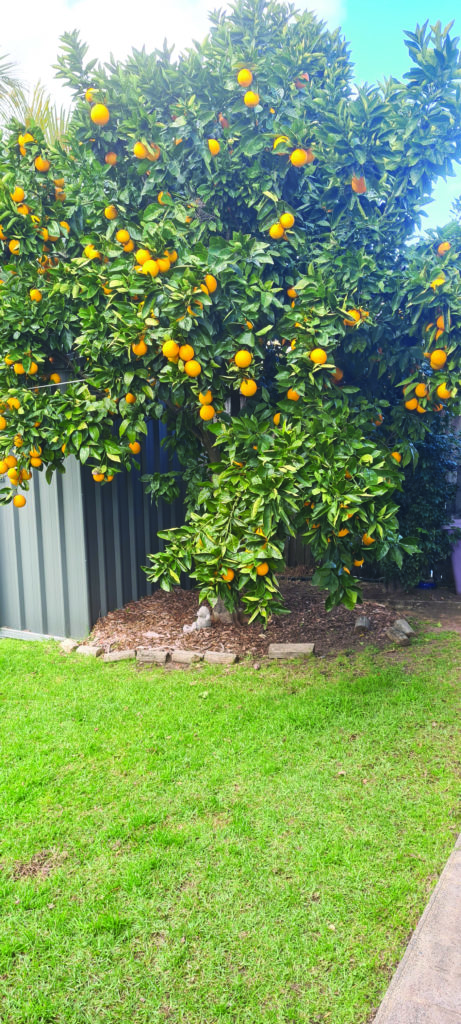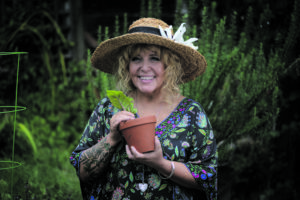The concept of ‘Zen’ gardening probably conjures up visions of monks exercising vows of silence while sitting in crossed-legged meditation or crystal windchimes dancing amongst wafts of incense but stay with me.
What is ‘Zen’ to one of us is going to be irritatingly nerve jangling or uncomfortable to another so let’s explore ways that will reflect your personal tastes, budget, and available areas to create personal calm inducing spaces.
Officially Zen is a type of Buddhism with a focus on meditation and awareness.
In modern terms it has come to mean feeling peaceful and relaxed and we can easily make small changes to our way of doing things in our garden and in what we include in it to inspire tranquilly.
Learn to Potter
We say it, but do we really do it?
Pottering in the garden involves no plans, no trailer loads of mulch, plants, and expectations.
Just walk to your garden space (indoor or out) and wander around, pulling a weed here, plucking off a pest there and deadheading as you go.
Maybe even planting that packet of seeds which you forgot about in your last gardening blitz or repotting a botanical friend who needs a bit more space.
The point is that you are not goal or outcome driven.
This is like a walk in the park, observing, relaxing and just taking in the view.
In fact, bring a cup or glass of your favourite beverage with you, throw on some music if you like and potter away.
My favourite pottering time is mornings and yes, I do leave my PJs on.
Seating
I think any garden or botanical spot with a peaceful vibe needs a seat of some sort.
While it is lovely to wander and to stand around a garden created for calm, being able to sit is important.
To rest yourself physically as well as mentally and to just ‘be’ within the space for as long as you need is far better achieved with a seat.
While outdoor furniture is one answer, so are benches and stools created from old tree stumps and upcycled weather resistant materials.
My favourite bench in my garden is just an old sleeper bolted to a couple of tree stumps or go all the way with a lounge or day bed.
Sculptures
This can be the form of a created sculpture of any size or a nature feature that serves as a sculptural piece.
An interesting log, an old piece of machinery or equipment.
Sculpture in the garden rests our minds with something of beauty or makes us curious and in turn this takes our thoughts away from what may be disrupting our peace.
The elephant in the garden is probably garden gnomes and I am not about to comment on your taste so if you like them … if they or a 10-foot-high Buddha, collection of fairies or for that matter, an elephant figure are your idea of peaceful bliss then … do it!
Open Areas
A great expanse of nothingness could also be your idea of Zen, but even if you find sitting in a jungle of green soothing, a small clear space within gives you a place to rest your gaze and is a design element that will enhance the garden by providing contrast between the full and the void.
You may also enjoy sitting, lying, or collapsing on the grass after a particularly stressful day.
Indoor Oasis
The houseplant craze is well and truly upon us and to be honest, I’m a fan.
It’s created a lot of new garden-curious people and that’s not a bad thing at all.
While you may not need an Instagram-worthy indoor curation of plants, having an area with an inviting chair surrounded by botanical goodness would qualify as a Zen indoor garden in my books.
Adding plants to areas of high traffic and family activity can also help calm the vibe.
Water Features
Fountains, fishponds and water plant features are all such soothing and alluring places in gardens and if you have the space and the desire then you really should investigate.
Should you already have a pool or spa, consider surrounding with some of the plants listed below to add to the Zen.
Why water makes us feel calm is not really known but it has been shown to slow our brainwaves and there is some evidence that the sounds we could hear in the womb, a time we would have felt safe, are reminiscent of other water sounds.
Calm Inducing Plants
What’s a Zen Garden without plants?
You could have a completely hard-scaped design that gave you a blank canvas to meditate upon but adding a few plants that are known to have additional anxiety-reducing and calm evoking properties will make your green space more peaceful.
Firstly, consider greening up areas with soft textured plants which are within reach that suit your environment, and this could include ferns, shrubs, and grasses.
The gentle movements in caught breezes will calm the mind and the greenness soothe the soul.
The following plants can all be grown inside or out and have additional therapeutic qualities for Zen living.
Aloe vera (Aloe barbadensis miller) is known for its skin healing benefits but it also purifies the air of carcinogens and emits oxygen at night.
Peppermint (Mentha × piperita) when grown near pathways and seating areas will enable you to brush past and release the aromatics that help bring clarity to your mind and feel less frustrated. Been found to lower frustration and boost alertness.
Chamomile (Matricaria chamomilla) is almost famous for its sleep inducing and relaxation characteristics when used in teas. Cutting the flowers and drying to use in potpourris will bring the same benefits into your home.
Basil (Ocimum basilicum) contains within it a compound known as ‘linalool’ which has been found to reduce the activity of certain genes that are triggered during stressful situations.
The Snake Plant (Dracaena trifasciata) is one of the best plants for purification of the air, according to NASA and while they purify the air during the day, they emit oxygen at night.
Lavender (Lavandula spp.) is a must in any garden as the flowers and the leaves contain the powerful aromatics. By inhaling the scent of lavender, it has been shown to especially decreased feelings of depression and confusion.
Jasmine (Jasminum officinale) fragrance is a super soother and anxiety reliever for many. A study published in the Journal of Biological Chemistry reported that the smell of Jasmine can be a soothing as Valium.
Catmint (Nepeta cataria) is not just for cats! It not only sooths the nerves of our feline friends but of humans as well.
GARDEN RESCUE
Nad from Woongarrah writes:
“Hi Cheralyn, My orange tree has plenty of fruit but for the past 2 months they are still a bit sour to eat.
Last crop we had were nice and sweet and came at different time of the year, this lot started to appear in Autumn.
Is it something I have to add to the soil? I have been feeding it every 3 months and spraying it.
Do I have to wait until they fall of the tree before eating – the ones that fall off the tree are usually bad and slit opened.”
Hi Nad, That’s a great crop!
Early drop of citrus fruit happens due to sudden temperature changes or inconsistent/insufficient watering. Oranges need warmth to sweeten and picking too early will also often mean sour fruit.
I’m writing this during a bit of warm spell here for the Central Coast for this time of year so that may improve your crop this year.
If not, all is not lost as sour oranges are brilliant for cooking.
Think candied peel, marmalades, chutneys, sauces, and baked treats.
You don’t have to wait for them to fall off the tree, but they should come away easily with a simple twist.
PLANT HAPPENINGS
Again, nothing to report due to restrictions but please don’t forget to drop those online happenings to me and any news!
Let’s look at a newish Gardening Book. ‘Yates Month by Month’, the complete guide of what to do in your garden throughout the year by Judy Horton.
I highly recommend this book especially for beginner gardeners as it sets out clearly the tasks, plantings, and the expectations of each month in Australian gardens.
THIS WEEK YOU COULD PLANT
You could plant artichokes, asparagus crowns, beetroot, broad beans, cabbage, carrot, English spinach, lettuce, mustard, late season onions, parsnip, peas, potatoes, radish, rhubarb crowns, salsify, silverbeet, alyssum, California poppy, carnation, cosmos, dahlia, dianthus, everlasting daisies, gerbera, marigold, petunia, salvia, zinnia, kangaroo paw.
Cheralyn Darcey is a gardening author, community garden coordinator and along with Pete Little, hosts ‘At Home with The Gardening Gang’ 8 – 10am every Saturday on CoastFM963
Send your gardening questions, events and news to: gardeningcentralcoast@gmail.com





